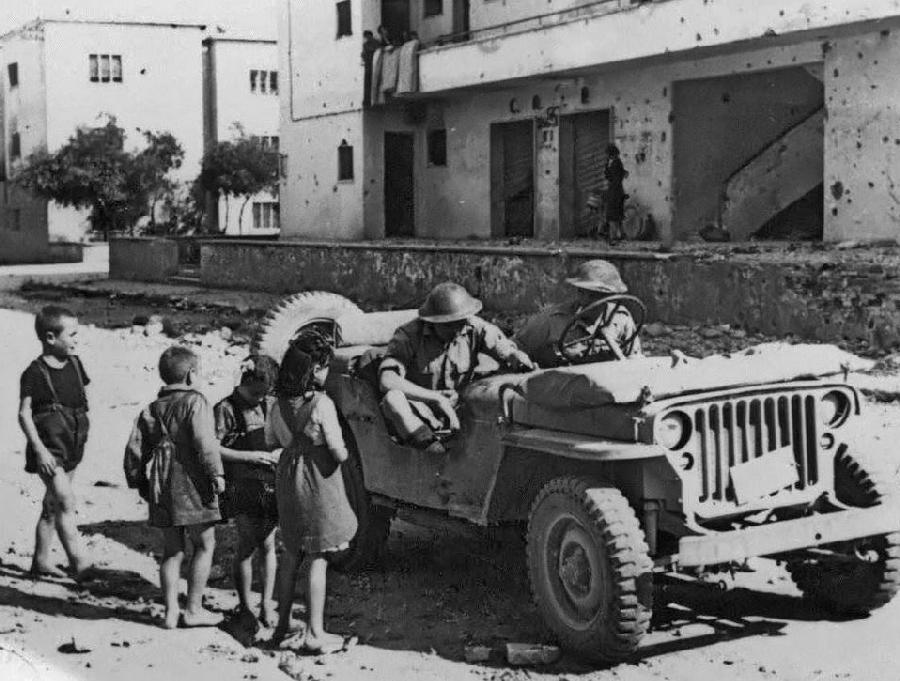
World War II Italian Campaigns: Gustaf Line--Pontine Marshes (1943-44)

Figure 1.--The photo was taken in Littoria, a town founded by Benito Mussolini (June 1932) and named for the Facist littorio (symol derived from ancient Rome). After the war the name was changed to Latina. Littoria was one of the plannec new towns built as part of the draining of the Pontine Marshes and the reclaiming of the land. Four curious children are approaching two British soldiers. (Notice their American Jeep. The Allied troops entered Littoria as the Gustaf Line was disentegrating (May 24, 1944). Rhey look to be in the town square. Notice all the bullet holes in the buildings.
|
|
The Allies planned an amphibious end run to outflank the Gustav Line. the Gustaf Line was located south of the Pontine Marshes. Draining the Pontine Marshes was one of the great achievements of Mussolini's Fascist regime. The Marshes were used by the Germans as part of their defenses. They were part of the reason that an amphibious landing at Anzio and Nettuno were needed to outflank the German defenses. As a result of the deteriorating conditions in Italy, malaria had returned to the Marshes. Quinine and other medicines were in short supply and there are reports thst the Germans were witholding supplies. The Germans saw the Italians as traitors and were intent on punishing them. In addition, there was a desire to reserve available supplies for their forces. Food was in increasingly short supply. Window screens were an important defense again mosquitos and malaria. But screns were made of metal and could no longer be obtined or repaired. Even worse, Italian soldiers returning from the Balkans brought back resistant strains of the disease home. [Snowden, p. 186.] The Germans a part of building the Gustav Line stopped the pumps and opened the dikes. This refilling the marsh with brackish water. German malariologists, Erich Martini and Ernst Rodenwaldt, advised Field Marshal Kesselring's staff that the brackish water would encourage the return of the mlaria carrying mosquito (Anopheles labranchiae). It is aspecies which thrives in brackish and salty environments. The brackish water would also devestate agriculture, making it impossible for the local population to grow crops or even obtain fresh water. This had no military impact, but the local population was left exposed to malaria and without food.
The German flooding of the Marshes has been called an act of biological warfare. [Evans] Italian colleagues of the Germans in malariology oposed the action, but the Germans issued the order. Of course the mosquitos did not descriminate, so the Allied and German soldiers aw well as the populstion found themselves in a mosquito-infested bog. The homes built by the Fascist regime were used by the German soldiers and to hide tanks from air strikes. American journalist Ernie Pyle wrote, "On these little farms of the Pontine marshes Mussolini built hundreds of ... stone farmhouses ... Now and then I saw a farmer plowing while German shells landed right in his field. We tried to evacuate people ... But some of them simply refused to leave their homes. Sometimes the Germans would pick out one of the farmhouses, figuring we had a command post in it, I suppose, and blow it to smithereens. Then, and only then, did some Italian families move out ... on any side road we couldn't drive five minutes without seeing the skeleton of a cow or a horse." [Pyle]
Sources
Pyle, Ernie. Brave Men (Lincoln: University of Nebraska Press, 2001).
Snowden, Frank M. The Conquest of Malaria: Italy, 1900-1962 (New Haven: Yale University Press, 2006).
CIH

Navigate the CIH Wold War II Pages
[Return to Main Anzio landings page]
[Return to Main Italian campaign page]
[Return to World War II European campaign second phase page]
[Biographies]
[Campaigns]
[Children]
[Countries]
[Deciding factors]
[Diplomacy]
[Geo-political crisis]
[Economics]
[Home front]
[Intelligence]
[POWs]
[Resistance]
[Race]
[Refugees]
[Technology]
[Totalitarian powers]
[Bibliographies]
[Contributions]
[FAQs]
[Images]
[Links]
[Registration]
[Tools]
[Return to Main World War II page]
[Return to Main war essay page]
[Return to CIH Home page]
Created: 10:45 PM 10/27/2014
Last updated: 10:45 PM 10/27/2014



